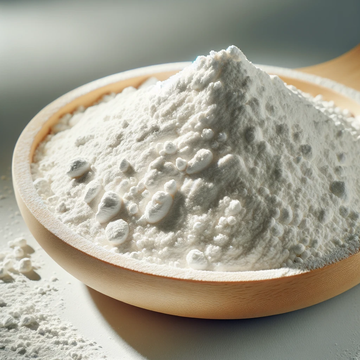In the world of fitness and athletic performance, the journey towards optimal muscle repair and growth is challenging. It's marked by rigorous training and the relentless pursuit of peak physical condition. Two key ingredients in this journey are collagen and vitamin C.
Collagen, the most abundant protein in our bodies, is not just a structural component of skin and bones, but also plays a vital role in muscle repair and regeneration. It provides strength and elasticity to the muscle tissues, aiding in their recovery and growth post-exercise. Vitamin C is renowned for its antioxidant properties and is crucial for the synthesis of collagen. It aids in the repair of damaged muscle fibers and facilitating recovery from intense physical exertion.
Collagen and Vitamin C Basics
The Role of Collagen in the Body
Collagen is the most abundant protein in the human body, making up about one-third of the total protein. It is a key component of connective tissues such as tendons, ligaments, and cartilage, as well as the skin, hair, and nails. Collagen provides structural support and helps maintain the strength and elasticity of these tissues. It also plays a role in wound healing and tissue repair.
The Role of Vitamin C in the Body
Vitamin C, also known as ascorbic acid, is an essential nutrient that the body cannot produce on its own. It is required for the synthesis of collagen, as well as other important biological processes. Vitamin C is a water-soluble vitamin and acts as an antioxidant, protecting cells from damage caused by free radicals.
The Synergy Between Collagen and Vitamin C
Collagen and vitamin C work together to maintain the health and integrity of various tissues in the body. Vitamin C is necessary for the synthesis of collagen, and without it, collagen production is impaired. In turn, collagen provides structural support and helps to maintain the strength and elasticity of tissues, including the skin. As we age, collagen production naturally declines, which can lead to wrinkles, sagging skin, and joint pain. Ensuring adequate vitamin C intake can help support collagen production and maintain healthy tissues.
In summary, collagen and vitamin C are essential for maintaining the health and integrity of various tissues in the body. Vitamin C is necessary for the synthesis of collagen, while collagen provides structural support and helps to maintain the strength and elasticity of tissues. By ensuring adequate vitamin C intake, we can support collagen production and maintain healthy tissues.
Health Benefits
Collagen and Vitamin C have several health benefits that can improve various aspects of our wellbeing. In this section, we will explore some of the most significant benefits of these two essential nutrients.
Skin Health Enhancement
Collagen and Vitamin C are crucial for maintaining healthy skin. Collagen is a protein that gives our skin its strength and elasticity. As we age, our body produces less collagen, which can lead to wrinkles and sagging skin. Vitamin C is necessary for collagen synthesis, which means that it helps our body produce collagen. Therefore, consuming foods rich in collagen and Vitamin C can help improve skin health and reduce the signs of aging.
Joint and Bone Support
Collagen is also essential for maintaining healthy joints and bones. It is the main component of cartilage, which is the connective tissue that cushions our joints. Studies have shown that taking collagen supplements can help reduce joint pain and improve joint mobility. Vitamin C is also necessary for bone health, as it helps our body produce collagen, which is a vital component of bone tissue.
Immune System Strengthening
Vitamin C is well-known for its immune-boosting properties. It helps our body produce white blood cells, which are essential for fighting off infections and diseases. Vitamin C also acts as an antioxidant, which means that it helps protect our cells from damage caused by free radicals. Collagen also has immune-boosting properties, as it contains amino acids that can help improve gut health. A healthy gut is essential for a robust immune system.
In conclusion, consuming foods rich in collagen and Vitamin C can provide several health benefits, including improved skin health, joint and bone support, and immune system strengthening. It is essential to consume a balanced diet that includes sources of these essential nutrients to maintain optimal health.
Dietary Sources
Collagen and Vitamin C are essential nutrients for maintaining healthy skin, bones, and joints. There are a variety of dietary sources of these nutrients, including natural food sources and supplements.
Natural Food Sources
Collagen is found in animal products, such as bone broth, chicken, beef, and fish. Bone broth is a rich source of collagen that can be made by simmering bones in water for one to two days. Chicken and beef are also good sources of collagen, particularly in the skin and connective tissues. Fish, such as salmon and tuna, are also rich in collagen.
Vitamin C is found in a variety of fruits and vegetables, including citrus fruits, kiwi, strawberries, bell peppers, broccoli, and tomatoes. These foods are also rich in antioxidants, which can help protect the body from damage caused by free radicals.
Supplements and Fortified Foods
Supplements are available for both collagen and vitamin C, but it is important to choose a reputable brand and follow the recommended dosage. Collagen supplements are typically made from animal sources, such as bovine or fish collagen, and may also contain additional nutrients, such as vitamin C.
Vitamin C supplements are widely available and can be taken in pill or powder form. However, it is generally recommended to get vitamin C from natural food sources whenever possible, as these foods also contain other beneficial nutrients.
Some foods, such as cereal and orange juice, are also fortified with vitamin C and other nutrients. However, it is important to read the labels carefully to ensure that these foods are not high in added sugars or other unhealthy ingredients.
Incorporating a variety of natural food sources and supplements into your diet can help ensure that you are getting enough collagen and vitamin C to support healthy skin, bones, and joints.
Collagen Synthesis
Collagen is a protein that provides structural support to the extracellular space of connective tissues such as skin, tendons, bones, and ligaments. Collagen molecules are made up of amino acids, and its rigidity and resistance to stretching make it the perfect matrix for these tissues. In this section, we will discuss the biosynthesis of collagen and the impact of vitamin C on collagen production.
Biosynthesis of Collagen
Collagen is synthesized by various cells, including fibroblasts, osteoblasts, and chondrocytes. The process of collagen synthesis involves several steps, including transcription, translation, and post-translational modification.
During transcription, the DNA sequence of genes encoding for collagen is first transcribed into messenger RNA (mRNA). This mRNA is then translated into a protein chain known as procollagen. After translation, procollagen undergoes several post-translational modifications, including hydroxylation, glycosylation, and proteolytic cleavage. These modifications are essential for the proper folding and assembly of collagen molecules.
Once procollagen is synthesized and modified, it is secreted into the extracellular space. In the extracellular space, procollagen molecules are cleaved to form mature collagen fibrils. These fibrils then assemble into collagen fibers, which provide structural support to connective tissues.
Impact of Vitamin C on Collagen Production
Vitamin C plays a crucial role in collagen synthesis. Vitamin C is required for the hydroxylation of proline and lysine residues in procollagen, which is essential for the proper folding and assembly of collagen molecules. Without adequate vitamin C, collagen synthesis is impaired, leading to connective tissue disorders such as scurvy.
In addition to its role in collagen synthesis, vitamin C also has antioxidant properties that protect collagen fibers from damage caused by free radicals. Free radicals can damage collagen fibers, leading to premature aging and skin damage. Vitamin C helps to neutralize these free radicals, protecting collagen fibers and promoting healthy skin.
Overall, collagen synthesis is a complex process that involves several steps, including transcription, translation, and post-translational modification. Vitamin C plays a crucial role in collagen synthesis, and its deficiency can lead to connective tissue disorders such as scurvy. Adequate intake of vitamin C is essential for healthy collagen production and maintenance.
Clinical Studies and Research
Collagen and Vitamin C have been the subject of numerous clinical studies and research. Here, we discuss the scientific evidence on skin health and the research on mobility and joint health.
Scientific Evidence on Skin Health
Collagen and Vitamin C are essential for maintaining healthy skin. Collagen is the most abundant protein in the skin, and it provides structure and elasticity. Vitamin C is a powerful antioxidant that helps protect the skin from damage caused by free radicals.
Several clinical studies have investigated the effects of collagen and Vitamin C on skin health. One study found that a drinkable nutraceutical collagen product containing biotin, vitamin C, acerola extract, zinc, and natural vitamin E complex improved skin elasticity and hydration in healthy women over 35 years old [1].
Another study demonstrated that Vitamin C supplementation can increase type I collagen synthesis, which is important for maintaining skin health [2]. Furthermore, a comparison of nutritional intake of Vitamin C versus topical application found that improved nutritional Vitamin C intake is most likely to benefit skin properties such as skin elasticity, hydration, and photoprotection [3].
Research on Mobility and Joint Health
Collagen and Vitamin C also play a crucial role in mobility and joint health. Collagen is a major component of cartilage, which is the connective tissue that cushions joints and provides support. Vitamin C is necessary for collagen synthesis and helps protect cartilage from damage.
A study investigating the effects of collagen peptide supplementation found that it was most beneficial in improving joint functionality and reducing joint pain [4]. Additionally, preclinical studies have demonstrated that Vitamin C has the potential to accelerate bone healing after a fracture and reduce oxidative stress parameters, without any adverse effects reported in either animal models or human participants [2].
In conclusion, the scientific evidence on skin health and research on mobility and joint health demonstrate the importance of collagen and Vitamin C in maintaining overall health and wellness. Incorporating these nutrients into our diet and supplement regimen may provide significant benefits for our skin, joints, and overall mobility.
[1] https://www.ncbi.nlm.nih.gov/pmc/articles/PMC8620403/
[2] https://www.ncbi.nlm.nih.gov/pmc/articles/PMC6204628/
[3] https://www.ncbi.nlm.nih.gov/pmc/articles/PMC5579659/
[4] https://www.ncbi.nlm.nih.gov/pmc/articles/PMC8521576/
Frequently Asked Questions
What are the benefits of using collagen and vitamin C together for skin health?
Collagen and vitamin C are two essential components for maintaining healthy skin. Collagen is a protein that provides structure and elasticity to the skin, while vitamin C is an antioxidant that helps protect the skin from damage caused by free radicals. When used together, collagen and vitamin C can help improve skin texture, reduce the appearance of fine lines and wrinkles, and promote overall skin health.
How does vitamin C contribute to collagen synthesis?
Vitamin C plays a critical role in the synthesis of collagen. It is required for the production of hydroxyproline and hydroxylysine, two amino acids that are essential for collagen synthesis. Additionally, vitamin C is an antioxidant that helps protect collagen from damage caused by free radicals.
What forms of collagen and vitamin C are most effective for skin care?
Collagen supplements are available in several different forms, including powders, capsules, and gummies. Collagen peptides, which are smaller molecules that are more easily absorbed by the body, are considered to be the most effective form of collagen for skin care. Vitamin C supplements are available in several different forms as well, including capsules, tablets, and powders. Liposomal vitamin C, which is encapsulated in a lipid layer that helps improve absorption, is considered to be the most effective form of vitamin C for skin care.
Are there any side effects associated with taking collagen supplements?
Collagen supplements are generally considered safe and well-tolerated. However, some people may experience mild side effects such as digestive upset, headaches, or skin rash. It is important to talk to your healthcare provider before starting any new supplement regimen.
How do collagen and vitamin C work synergistically in serums and creams?
Collagen and vitamin C work synergistically in serums and creams to promote skin health. Collagen helps provide structure and elasticity to the skin, while vitamin C helps protect collagen from damage caused by free radicals. When used together, these two ingredients can help improve skin texture, reduce the appearance of fine lines and wrinkles, and promote overall skin health.
What are the differences between collagen peptides and other types of collagen supplements?
Collagen peptides are smaller molecules that are more easily absorbed by the body than other types of collagen supplements. This means that collagen peptides are more effective at promoting skin health and improving skin texture. Other types of collagen supplements, such as hydrolyzed collagen and gelatin, are larger molecules that are less easily absorbed by the body. While these types of collagen supplements may still provide some benefits for skin health, they are generally considered to be less effective than collagen peptides.





